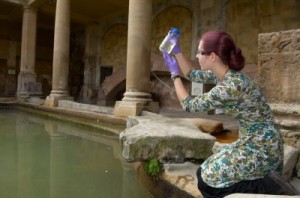Here is an interesting place to find feedstock for biodiesel – the Roman Baths. University of Bath researchers in the Department of Biology & Biochemistry are studying the algae growing in the Roman Baths as a source to produce biodiesel. The algae, growing in high temperature waters of the bath, may be a key to meeting growing biofuel needs.
Holly Smith-Baedorf, a PhD student, has made this project her own. “Algae are usually happiest growing at temperatures around 25 degrees celsius and that can limit the places in which it can be cultivated on a large scale,” said Smith-Baedorf. “Areas where these ideal conditions are available also usually make good arable areas and are therefore needed for food production. In an ideal world we would like to grow algae in desert areas where there are huge expanses of land that don’t have other uses, but the temperatures in these zones are too high for algae to flourish.”
 Where the conditions seem to be ideal are the Roman Baths. Smith-Baedorf explains that algae cells are quite versatile and can change any of their characteristics in response to their environment. Therefore, the protected environment provided by the baths make it an ideal environment for adaptation and thus research and the team has identified seven different types of algae in the baths.
Where the conditions seem to be ideal are the Roman Baths. Smith-Baedorf explains that algae cells are quite versatile and can change any of their characteristics in response to their environment. Therefore, the protected environment provided by the baths make it an ideal environment for adaptation and thus research and the team has identified seven different types of algae in the baths.
Another area she is studying is the ability to remove the oil from the algae – an important element to producing cost-effective algal biofuels. Therefore, the research team is also looking for a species of algae with a weaker cell wall, high oil content and the possibility to use cheap filtration techniques, keeping production costs low.
The research team is led by Professor Matt Davidson and also includes collaborators from the University of the West of England. The team is growing seven types of algae harvested from the Roman Baths over a range of temperatures and comparing them to ‘control’ algae known for being good for producing biodiesel at normal temperatures.
Professor Rod Scott added, “The results of this study will help us identify whether there is a particular algae species among the seven identified in the Roman Baths that is well adapted to growing at higher temperatures and also suitable for producing sufficient amounts of biodiesel to make wide-scale production viable.”

